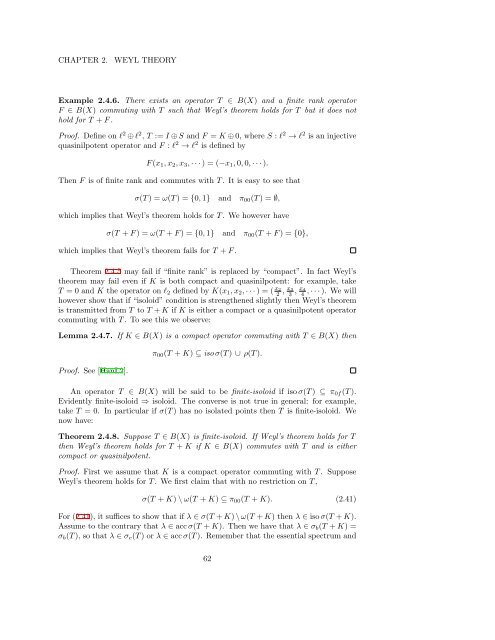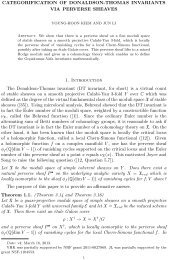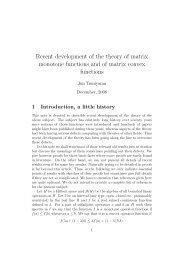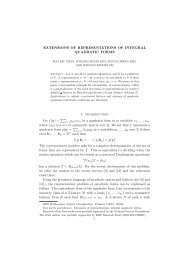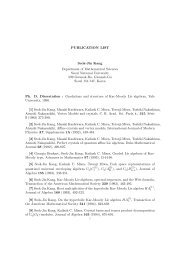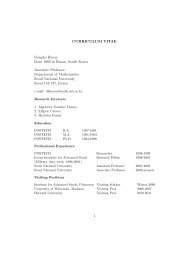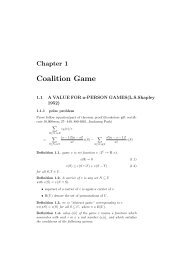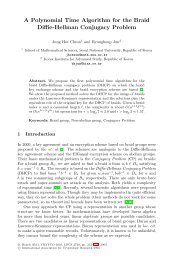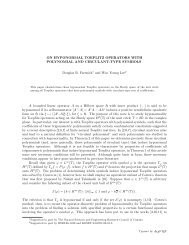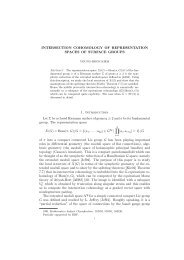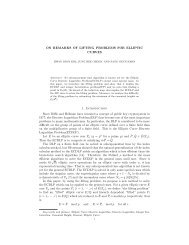Woo Young Lee Lecture Notes on Operator Theory
Woo Young Lee Lecture Notes on Operator Theory
Woo Young Lee Lecture Notes on Operator Theory
Create successful ePaper yourself
Turn your PDF publications into a flip-book with our unique Google optimized e-Paper software.
CHAPTER 2.<br />
WEYL THEORY<br />
Example 2.4.6. There exists an operator T ∈ B(X) and a finite rank operator<br />
F ∈ B(X) commuting with T such that Weyl’s theorem holds for T but it does not<br />
hold for T + F .<br />
Proof. Define <strong>on</strong> l 2 ⊕ l 2 , T := I ⊕ S and F = K ⊕ 0, where S : l 2 → l 2 is an injective<br />
quasinilpotent operator and F : l 2 → l 2 is defined by<br />
F (x 1 , x 2 , x 3 , · · · ) = (−x 1 , 0, 0, · · · ).<br />
Then F is of finite rank and commutes with T . It is easy to see that<br />
σ(T ) = ω(T ) = {0, 1} and π 00 (T ) = ∅,<br />
which implies that Weyl’s theorem holds for T . We however have<br />
σ(T + F ) = ω(T + F ) = {0, 1} and π 00 (T + F ) = {0},<br />
which implies that Weyl’s theorem fails for T + F .<br />
Theorem 2.4.5 may fail if “finite rank” is replaced by “compact”. In fact Weyl’s<br />
theorem may fail even if K is both compact and quasinilpotent: for example, take<br />
T = 0 and K the operator <strong>on</strong> l 2 defined by K(x 1 , x 2 , · · · ) = ( x 2<br />
2<br />
, x 3<br />
3<br />
, x 4<br />
4<br />
, · · · ). We will<br />
however show that if “isoloid” c<strong>on</strong>diti<strong>on</strong> is strengthened slightly then Weyl’s theorem<br />
is transmitted from T to T + K if K is either a compact or a quasinilpotent operator<br />
commuting with T . To see this we observe:<br />
Lemma 2.4.7. If K ∈ B(X) is a compact operator commuting with T ∈ B(X) then<br />
Proof. See [HanL2].<br />
π 00 (T + K) ⊆ iso σ(T ) ∪ ρ(T ).<br />
An operator T ∈ B(X) will be said to be finite-isoloid if iso σ(T ) ⊆ π 0f (T ).<br />
Evidently finite-isoloid ⇒ isoloid. The c<strong>on</strong>verse is not true in general: for example,<br />
take T = 0. In particular if σ(T ) has no isolated points then T is finite-isoloid. We<br />
now have:<br />
Theorem 2.4.8. Suppose T ∈ B(X) is finite-isoloid. If Weyl’s theorem holds for T<br />
then Weyl’s theorem holds for T + K if K ∈ B(X) commutes with T and is either<br />
compact or quasinilpotent.<br />
Proof. First we assume that K is a compact operator commuting with T . Suppose<br />
Weyl’s theorem holds for T . We first claim that with no restricti<strong>on</strong> <strong>on</strong> T ,<br />
σ(T + K) \ ω(T + K) ⊆ π 00 (T + K). (2.41)<br />
For (2.41), it suffices to show that if λ ∈ σ(T + K) \ ω(T + K) then λ ∈ iso σ(T + K).<br />
Assume to the c<strong>on</strong>trary that λ ∈ acc σ(T + K). Then we have that λ ∈ σ b (T + K) =<br />
σ b (T ), so that λ ∈ σ e (T ) or λ ∈ acc σ(T ). Remember that the essential spectrum and<br />
62


